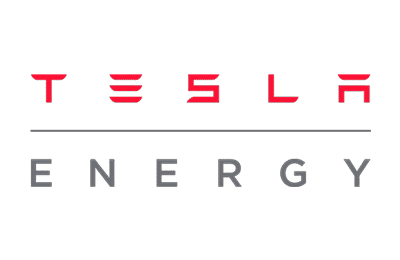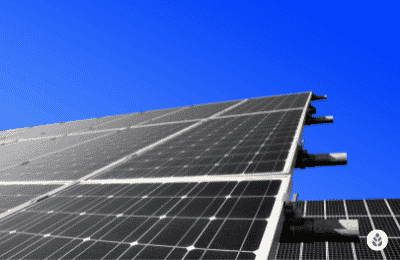
Top 7 Best Solar Companies in Washington (2024 Reviews)
In this guide on Washington’s best solar companies, you’ll learn:
- What are the best solar installers that serve Washington state?
- How can you save money when choosing a solar installer in Washington?
- What properties should you look for in a solar provider in Washington?
Each product and or company featured here has been independently selected by the writer. You can learn more about our review methodology here. If you make a purchase using the links included, we may earn commission.
Many people think Washington State isn’t a good place for solar because of the cloudy, rainy weather. In actuality, most systems pay for themselves in the Evergreen State and then provide additional energy savings totaling more than $14,200.
Since there is sufficient demand in the area, there are over 60 installers to choose from when converting to clean energy, which can make choosing the right one overwhelming. In this guide, we’ll provide a list of what we believe to be the best solar companies in Washington, and we’ll also explain what we recommend looking for in an installer to maximize your savings and get the best experience possible.
What Are the Best Solar Companies in Washington?
We’ve spent dozens of hours researching solar installers in your area, and the seven below are what we believe to be the best solar companies in Washington state.
- SunPower: Best National Provider
- Blue Raven Solar: Best Financing Program
- Tesla: Best Technology
- A&R Solar: Best Regional Provider
- Northwest Renewables: Best for System Customization
- Puget Sound Solar: Best Local Installer
- Solara Solar: Best Customer Service
You might be surprised not to see some of the more popular companies on our list, including Solgen and Lumio. We’ve decided not to include these providers, given ongoing issues with customer service and, in some cases, ongoing litigation.
Compare Washington’s Top-Rated Solar Providers
Overall, our top two recommendations are SunPower and A&R Solar, both of which bring outstanding quality and value to the table. We’ll include a side-by-side look at these providers and our other top picks in the table below. This should help you decide which provider is going to be best for your needs.
| Solar Providers | Superlative | Our Score | Avg Cost ($–$$$$$) | Warranty | Financing Options | Get Quote |
| SunPower | Best National Provider | 5/5 | $$$$ | Varies – minimum of 25 years for equipment, workmanship and production | Cash, solar loan, solar lease, PPA | Get Quote |
| Blue Raven Solar | Best Financing Program | 4.5/5 | $$ | 25 years for equipment and performance; 10 years for workmanship | Cash and solar loans | Get Quote |
| Tesla | Best Technology | 4.5/5 | $$ | 25 years for equipment and performance; 10 years for workmanship | Cash, solar loan, solar lease, PPA | Get Quote |
| A&R Solar | Best Regional Provider | 5/5 | $$$$ | 25 years for equipment and performance; 10 years for workmanship | Cash, solar loan | Get Quote |
| Northwest Renewables | Best for System Customization | 4.5/5 | $$$$ | 25 years for equipment and performance | Cash, solar loan | Get Quote |
| Puget Sound Solar | Best Local Installer | 5/5 | $$$ | 25 years for equipment, performance and labor | Cash, solar loan | Get Quote |
| Solara Solar | Best Customer Service | 4.5 | $$$ | 25 years for equipment and performance; 10 years for labor | Cash, solar loan | Get Quote |

SunPower
Pros
- Most efficient panels on the market
- National coverage
- Cradle to Cradle sustainability certification
- Great warranty coverage
Cons
- Expensive
- Customer service varies by local dealer

Blue Raven Solar
Pros
- Industry-leading in-house financing
- Competitive pricing
- Excellent reputation
Cons
- Doesn't offer solar batteries (coming 2022)
Blue Raven Solar has one of the best solar loan programs in the industry, with $0 down payment requirements and 18 months of interest-free financing.
Blue Raven has severely limited services available, so it’s really only ideal for those who just want panels installed and don’t need add-on products.
Why We Chose Blue Raven Solar as the Company With the Best Financing Program
Blue Raven Solar revolutionized solar financing with its BluePower Plus+ loan program. While many companies partner with third-party financiers to get loans for customers, Blue Raven’s in-house loan program requires no down payment to make solar as affordable upfront as possible.
More importantly, the loans include 18 months of interest-free financing. That means you can enjoy savings on your energy bills for a year and a half before making payments. The savings accrued in that time can be used to pay down a significant chunk of your system costs once you do start paying.
Although Blue Raven is a large national installer, it still puts a lot of effort into providing above-average customer service. The company is one of the few of its size that maintains 4.5-star customer ratings and an A+ score on the Better Business Bureau’s (BBB) website.
What We Don’t Like
The biggest downside to choosing Blue Raven Solar is that you’ll only have access to solar panels. The company is one of the few that doesn’t install solar batteries, EV chargers or other solar equipment. As such, you have very limited customization options with Blue Raven Solar.
Additionally, while Blue Raven’s loan program is outstanding, the company doesn’t accept leases or PPAs. That does mean accessibility is slightly limited, although the financing program is more accessible than most.
Read our full review of Blue Raven Solar for more information.
Solar Products
Blue Raven Solar installs panels from Hyundai, Canadian Solar, Trina and SolarEdge. These are all considered high-quality residential PV panel brands, but they do bring different things to the table.
If you want to make the most of the minimal sunlight in Washington, we recommend the Trina panels. These have the highest efficiency and are most likely to offset your electric bills. The SolarEdge panels have the lowest per-watt cost and are likely best if you want to minimize your system price.
Aside from these solar panel brands, Blue Raven only offers Enphase inverters, which give you access to the Enphase solar monitoring app. The company doesn’t handle solar battery or EV charger installations, nor does it offer any energy efficiency home improvements.
Financing Options
Blue Raven only accepts cash payments and loans. The BluePower Plus+ loan program is a highly accessible solar payment option that requires no upfront payment and lets you put 18 months of energy savings toward your system cost, totally interest-free.
Cash will still be a better option, as it leads to a faster panel payback period and higher long-term savings on your electric bills. Both options give you access to the federal solar tax credit, though, so we feel comfortable recommending either of them based on what works for you.
Warranty Information
Blue Raven Solar includes a 25-year warranty for its equipment and the panel production. These come from the manufacturer and are about what you’d expect from most other installers and panel manufacturers.
The installer does, however, offer its own ten-year workmanship warranty. This is average, but we ideally like to see longer labor coverage. The frequent rainfall in Washington puts panels at an elevated risk of damage and leaking, so an above-average workmanship warranty is preferred for peace of mind and panel longevity.
Facts and Figures: Blue Raven Solar
| EcoWatch Rating |
|---|
| Better Business Bureau (BBB) Rating |
| Year Founded |
| Average Cost ($-$$$$$) |
| Solar Services |
| Brands of Solar Equipment Offered |
| Warranty Coverage |
| 4.5 |
| A+ |
| 2014 |
| $$ |
| Solar Panels, System Monitoring |
| Trina Solar, Canadian Solar, SolarEdge, Silfab, SunPower |
| 25-year manufacturer warranty; 10-year workmanship warranty, 2-year production guarantee |

Tesla Energy
Pros
- Price-match guarantee
- Sleek, efficient and durable solar panels
- Best solar battery on the market
Cons
- Some reported issues with customer service
- Customer service varies by local dealer
Tesla’s solar products work seamlessly with one another to provide you with a pleasant post-installation experience and boosted energy savings.
Tesla outsources its installations to third parties, which can create some issues with customer service. Still, we think it’s a good option, especially if you want add-on products.
Why We Chose Tesla as the Company With the Best Technology
Tesla is a tech company, so, of course, it focuses on the user experience of its products. While it doesn’t manufacture its own panels anymore, the integration its QCells panels has with its solar batteries and EV chargers is outstanding.
The Tesla Powerwall includes convenient features like StormWatch, which will automatically prepare your system to store excess energy when there’s a risk of a local power outage. The Tesla app also gives you total control over how your energy is allocated, so you can set up your system to maximize energy savings or provide lengthy off-grid power.
Tesla also offers price matching for its panels, so it’s the most affordable option for getting QCells equipment. Plus, its prices are below average, and it accepts a variety of payment options. This all means its products and services are more accessible than those from many other providers.
What We Don’t Like
The biggest downside to Tesla, in our opinion, is that it outsources its installations. The work will be assigned to a certified third-party installer, which isn’t necessarily a bad thing, but it means Tesla isn’t able to guarantee a positive customer experience.
Additionally, Tesla only installs a single brand for each product: QCells panels and Tesla-branded batteries and EV chargers. We prefer companies that have a few options that might appeal to homeowners in different financial situations or with different energy demands. Still, the equipment that is offered is high-quality.
Read our full review of Tesla for more information.
Solar Products
As mentioned above, Tesla only installs QCells panels now that it no longer manufactures its own panels. QCells doesn’t have the highest efficiency rating, but the 21.4% rating is well above average, and it should be enough to offset energy needs in the area despite the lack of sunlight.
The QCells panels have a below-average degradation rate in the first year — 2% as compared to 2.5% — but the degradation in subsequent years is slightly above average, which isn’t ideal.
We’ll include a list of other products and services Tesla provides to customers below:
- Tesla Powerwalls
- Tesla EV chargers
- Tesla solar roofing shingles
- The Tesla solar monitoring app
Financing Options
Tesla as a whole accepts cash purchases, solar loans, leases and PPAs. Cash is going to be your best option, as it leads to the greatest long-term savings. Loans come with fewer energy savings but don’t preclude you from taking the federal credit, as leases and PPAs do.
Solar leases can be beneficial if you can’t qualify for a loan, but they save much less than cash and loans. Leases have been a point of contention in Washington State, so it’s unclear if they will actually be available from Tesla.
Warranty Information
Tesla provides a 25-year warranty that covers the performance of the panels — which is above average — and manufacturer defects — which is average.
In Washington, we also look for workmanship warranties since the weather patterns in the area put rooftop solar arrays at an elevated risk of damage and leaking. Tesla includes a ten-year labor warranty, which is in line with the industry average but shorter than we’d ideally like to see in the area.
Keep in mind, also, that Tesla’s spotty customer service can mean delays in responding to warranty claims.
Facts and Figures: Tesla Energy
| EcoWatch Rating |
|---|
| Better Business Bureau (BBB) Rating |
| Average Cost ($-$$$$$) |
| Solar Services |
| 4.5 |
| C |
| $$ |
| Solar Panels, Solar Batteries, EV Chargers, Solar Roof Shingles, System Monitoring |
A&R Solar
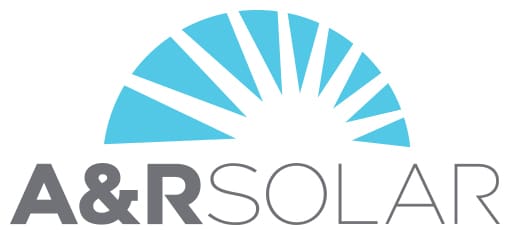
Average cost
Pros
- Years of local experience
- NABCEP-certified installers
- Outstanding customer service
Cons
- Expensive
- Not the best workmanship warranty
- No leases or PPAs
A&R Solar provides outstanding customer service and decades of localized experience to provide one of the best solar experiences available in Washington.
The installer is a little on the expensive side and doesn’t accept leases, but we feel the cost is more than worth it for your Washington solar conversion.
Why We Chose A&R Solar as the Best Regional Provider
A&R Solar has been serving Washington and Oregon since 2007, meaning it has over 15 years of experience, specifically in the Evergreen State. Its representatives are highly trained and hold certifications from the North American Board of Certified Energy Practitioners (NABCEP). Along with the local expertise, this should instill confidence in customers and provide the ultimate peace of mind that your system is being installed properly.
As a small company, A&R is able to give customers the care and attention they want and deserve. Your system will be custom-designed for your specific home and energy needs, and the hands-on representatives will be able to help you file for local incentives and rebates that larger companies might miss.
A&R also installs a nice variety of panel brands, one of which is Maxeon, which is the best suited to produce sufficient energy in the low-sunlight conditions in Washington.
What We Don’t Like
A&R Solar’s pricing is a little above the state average, so you’ll likely pay more for a system overall than you would from competitors. However, we do feel that the quality and service are worth the extra cost, as is evidenced by the many positive reviews this company has amassed.
Additionally, A&R includes a ten-year workmanship warranty, which is in line with the average. However, in a high-risk state like Washington, where rainfall is frequent and puts systems at greater risk, we’d love to see a lengthier warranty term.
Solar Products
A&R Solar installs panels manufactured by Maxeon (formerly SunPower), QCells and SolarEdge. These are all high-quality brands that should suit most homeowners, even in Washington, where sunlight is comparatively scarce.
We strongly recommend the Maxeon brand for peak efficiency and energy savings, but the SolarEdge panels could be a better option if you prefer to prioritize a lower installation total.
We’ll include a list below of all of the additional products and services you can get access to via A&R:
- Tesla Powerwalls — keep in mind that the installer has a minimum in place of two batteries, which we’d recommend anyway
- New construction solar projects
- The MySunPower and Tesla solar monitoring apps
- Commercial solar projects
Financing Options
A&R Solar only accepts cash purchases and solar loans. These are the only two options we recommend to most homeowners, as they let you take the federal credit — an average value of over $8,000 in Washington — and they lead to panel ownership, which is to say higher savings down the road.
We do prefer companies that also provide access to leases, mostly because they help keep PV equipment accessible to those who can’t pay upfront for a system or qualify for a loan.
Warranty Information
A&R installs equipment that comes with 25 years of protection for the equipment and production. That means you don’t have to worry about manufacturer defects or unexpected dips in efficiency, both of which can cut into your solar savings.
The company also offers a ten-year workmanship warranty, which is the average in the industry. We would prefer longer coverage, given the excessive rainfall in Washington, but we do believe that the company’s expertise naturally reduces your risk of any issues.
Facts and Figures: A&R Solar
| EcoWatch Rating |
|---|
| Better Business Bureau (BBB) Rating |
| Year Founded |
| Average Cost ($-$$$$$) |
| Solar Services |
| Brands of Solar Equipment Offered |
| Warranty Coverage |
| 5 |
| A+ |
| 2007 |
| $$$$ |
| Solar panel and battery installations, Commercial solar, Solar for new construction |
| Maxeon, QCells, SolarEdge |
| 25 years for equipment and efficiency, 10 years for workmanship |

Northwest Renewables
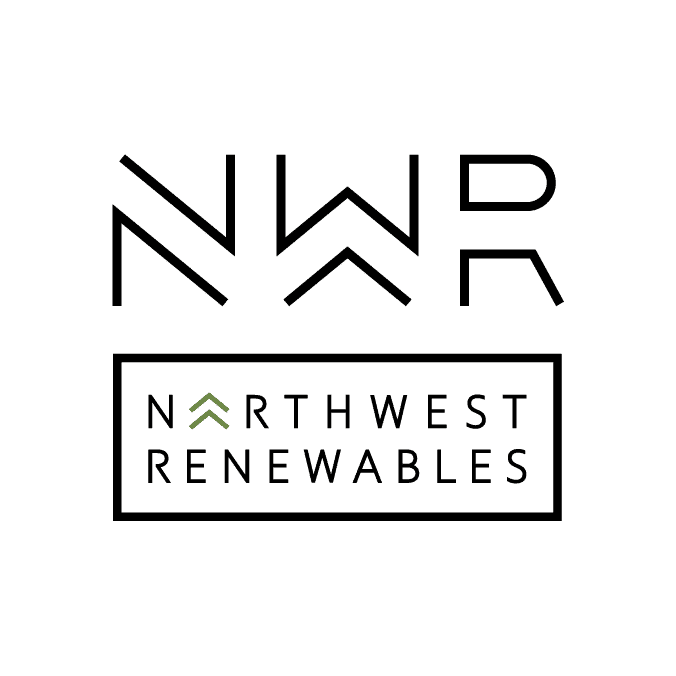
Regional Service
Average cost
Pros
- Outstanding customer service
- Multitude of products and services
- Representatives are experts on local policies
Cons
- Limited service area
- Limited warranty coverage
Northwest Renewables couples standard solar services with add-on products and energy efficiency upgrades for a full-service energy experience.
The company most notably doesn’t have a formal workmanship warranty, which is an important thing to consider before hiring the installer to handle your Washington solar project.
Why We Chose Northwest Renewables as the Best for System Customization
Northwest Renewables brings a lot of things to the table, but we feel the most impressive is its line-up of services.
Not only does this provider install solar panels, solar batteries and EV chargers for solar system customization, but it also installs generators and ductless heating and cooling systems. That means you can get the solar system you want and convert your heating/cooling system to electric to take full advantage of your solar array.
As a relatively small company that only serves the Pacific Northwest, this provider is able to maintain an outstanding customer service record. It has an A+ rating with the BBB, as well as an outstanding 4.8-star rating on Google Reviews. Most customers rave about the communication and professionalism of this provider.
Plus, since its technicians and salespeople are locals, they have a healthy understanding of Washington solar incentives and can help maximize your savings by taking advantage of them.
What We Don’t Like
The first and most significant downside to Northwest Renewables (NWR) is that it doesn’t offer a formal workmanship warranty. We really like to see companies with at least the industry standard of ten years, and although the company’s experience should help you avoid issues, this is a pretty major downside to consider.
Additionally, NWR is less accessible than many competitors. Its services are more expensive than most, and it doesn’t accept leases, which can help maintain accessibility for providers with high installation costs. This is especially important because Washingtonians already pay above-average prices for solar.
Solar Products
Northwest Renewables installs panels from Canadian Solar and SolarEdge, so the options are limited. These are both great brands with above-average production capability and longevity, but we would prefer to see more options. Canadian Solar is our recommendation if you want to maximize production, but SolarEdge panels are more affordable.
We’ll include a list of other products that NWR installs alongside its panels:
- Blue Frog microinverters; these are made by a local company and maximize production in partial shade — a huge benefit in Washington, given the frequent cloudy weather
- Solar batteries — the company doesn’t specify the brands offered
- Generators
- Mitsubishi mini-splits for heating and cooling
- Electric vehicle chargers
- Commercial solar projects
Financing Options
Like most regional companies, Northwest Renewables only accepts cash purchases and loans. If you can make a cash purchase work, we recommend it. It’s less accessible in Washington than average, given the already high installation costs, but paying upfront means you maximize your savings over time.
A solar loan is a better option if you want to minimize your initial costs, but it does mean you’ll pay interest, which will drive up your all-in system costs over time.
Warranty Information
Northwest Renewables installs solar equipment that comes with a 25-year warranty for the equipment itself and the production. The efficiency warranty is a little longer than average — with the industry average sitting at 20 years — and the panel warranty is right in line with the average.
Unfortunately, NWR doesn’t offer any workmanship warranty, which pales in comparison to the industry standard of ten years. This is a pretty big downside in Washington, where panels are at an above-average risk of issues, given the frequent precipitation.
Facts and Figures: Northwest Renewables
| EcoWatch Rating |
|---|
| Better Business Bureau (BBB) Rating |
| Average Cost ($-$$$$$) |
| Solar Services |
| 4.5 |
| A+ |
| $$$$ |
| Solar Panels, Solar Batteries, General Contracting, Electrical Work |

Puget Sound Solar
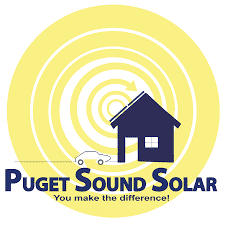
Local Service
Average cost
Pros
- Representatives are experts on local policies
- Many years of experience
- Comprehensive service offerings
- Excellent reputation
Cons
- Limited service area
Puget Sound Solar is a small company that delivers hyper-localized experience and expertise coupled with incredible customer service.
The company doesn’t accept leases, so it’s not quite as accessible as some competitors, but customers who can go solar with this provider shouldn’t be disappointed.
Why We Chose Puget Sound Solar as the Best Local Installer
Puget Sound Solar has been serving the Puget Sound area since 2001, so it has over two decades of local experience. With that experience, its representatives are able to provide a solar array that is customized to your unique needs and that can stand up to the frequent inclement weather in the area.
As a small company, Puget Sound Solar (PSS) is also able to provide outstanding customer service. Customer reviews for this company commonly mention how hands-on and communicative the technicians are and how helpful they can be in filing for local solar incentives to boost savings. This kind of customer service is, unfortunately, less common in Washington, as lots of companies have popped up just to take advantage of the high demand.
PSS couples its customer service during the installation with equal service after. It has lengthy warranty coverages, including a stellar 25-year workmanship warranty that is ideal in rainy states like Washington.
What We Don’t Like
There isn’t much we can say about Puget Sound Solar that isn’t overwhelmingly positive. The only significant downside is that the company doesn’t accept leases, so its services aren’t going to be quite as accessible to Washington homeowners as those from some competitors.
Another thing to consider — which is more of a product of PSS being a small local company — is that it has a limited service area. As the name suggests, it only operates in cities around the Puget Sound, so customers outside of this area might need to find a different installer.
Solar Products
Puget Sound Solar installs a wealth of panel brands to choose from, as it takes a more customized approach to solar systems. The provider can work with a variety of brands to suit your needs, which we love to see. That means you can opt for a high-efficiency brand to increase your chances of eliminating your energy bills despite the minimal sunlight availability, or you can choose a more affordable brand to keep installation costs low.
In addition to panels, Puget Sound Solar works with the following products and services:
- Tesla Powerwalls
- EV charging station installation
- Enphase and Tesla solar monitoring apps
- Several energy efficiency upgrades for your home
- Commercial solar projects
Financing Options
Puget Sound Solar only accepts cash purchases and loans. A cash purchase is the least accessible payment option because it requires that you pay for your system in full — an average of nearly $27,000 in Washington before incentives. However, cash payments mean greater utility bill savings over time, so they’re our recommended option.
Solar loans are a great alternative because they reduce your upfront payment — often to $0 — and still let you take the federal credit. We would prefer to see PSS accept leases as well for accessibility, even though we don’t generally recommend them.
Warranty Information
The warranty coverage is another area where Puget Sound Solar shines compared to the competition. It offers a comprehensive warranty that covers the panels, efficiency and workmanship for 25 years. The efficiency and labor coverage are longer than most companies will offer.
In our opinion, the labor warranty — which is 2.5x the industry average — is the best of the three. Rooftop solar arrays in Washington State see a lot of rain, and having robust warranty protection provides peace of mind that your system will persist without any issues.
Facts and Figures: Puget Sound Solar
| EcoWatch Rating |
|---|
| Better Business Bureau (BBB) Rating |
| Average Cost ($-$$$$$) |
| Solar Services |
| 5 |
| A+ |
| $$$ |
| Solar Panels, Solar Batteries, EV Chargers, Energy-Efficiency Upgrades, General Contracting |

Solara Solar
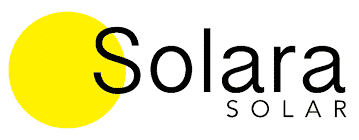
Local Service
Average cost
Pros
- Outstanding customer service
- Representatives are experts on local policies
- Many years of experience
Cons
- Limited service area
Solara Solar is a local company with lots of experience, specifically in Washington. It couples a great range of products and services with outstanding customer service.
Solara doesn’t accept leases and doesn’t have the best workmanship warranty, but overall it’s a great option for Washington homeowners, in our opinion.
Why We Chose Solara Solar as the Best for Customer Service
Solara Solar is a small company that operates in Bellevue, Tacoma, Walla Walla, Yakima and the Tri-Cities area. With such a small footprint, it’s able to provide unparalleled customer service to customers throughout its service area. The company has an A+ rating with the BBB and an incredible 4.6-star rating on Google Reviews, which is evidence that it has provided great customer care for the past 10+ years.
The company also provides hyper-local experience and expertise to bring peace of mind and reassurance to Washingtonians, which can be hard to come by given the high demand and the large number of young installers in the state. Not only does the company have over a decade of experience, but its techs are NABCEP certified and licensed in the state.
Additionally, the company provides access to a wide range of panel brands, equipment and services, so customers can get a truly customized system.
What We Don’t Like
Solara Solar mostly brings positive things to the table. However, we do wish its workmanship warranty was longer. It offers ten years of coverage for the labor, which is standard, but in an area like Washington, we’d love to see more to ensure its systems stand up to the excessive rain for multiple decades.
Additionally, Solara is another company that doesn’t accept leases, so you’ll either have to pay in cash or with a loan. This means it won’t be accessible to some customers who can’t afford an upfront purchase and don’t have the credit required for loan approval.
Solar Products
Solara Solar works with a variety of solar panel brands, including Trina, SolarWorld and SolarEdge. It also notes on its website that it can get access to other brands, which allows you to customize your system based on your particular needs.
The Trina panels deliver some of the highest efficiency available from Solara, so they’re best for pushing up your rate of production. The other two options mentioned above can be suitable for reducing your system costs.
Below, we’ll include a list of other products and services Solara provides to customers:
- SolarEdge batteries
- LG Chem solar batteries
- Enphase Ensemble batteries
- Off-grid solar installations
Financing Options
Like most other local companies, Solara Solar doesn’t accept leases or PPAs, so your options will be limited to cash and solar loans. Paying in cash will yield the highest saving possible, but it will require that you pay for your entire system upfront. This is less realistic in WA than in most states, given the above-average cost of solar conversion in the state.
Solar loans are more affordable upfront, although they do lead to reduced savings over time. Solara Solar partners with Puget Sound Cooperative Credit Union, Tri-Cu Credit Union and Umpqua Bank to bring loan options to customers.
Warranty Information
Solara Solar systems include 25 years of coverage for the equipment, which most companies offer, and a 25-year production guarantee, which is a few years above the industry average.
There’s also a workmanship warranty included that lasts for ten years. As mentioned with other installers, this is in line with the industry average, but we do wish it was a bit longer, as systems in Washington are at greater risk of damage from constant exposure to rain and moisture.
Facts and Figures: Solara Solar
| EcoWatch Rating |
|---|
| Better Business Bureau (BBB) Rating |
| Average Cost ($-$$$$$) |
| Solar Services |
| 4.5 |
| Not Rated |
| $$$ |
| Solar Panels, Solar Batteries, EV Chargers, Energy-Efficiency Upgrades |
Watch Below: What Should You Know About Recent Changes to the Solar Tax Credit?
How to Save Money When Hiring a Solar Company in Washington
The average price of a complete solar panel system in Washington is around $33,600 before any tax breaks or $23,520 after the federal tax credit is considered. These numbers assume the average per-watt price of $3.36 in Washington and the standard system size required in the state, which is around 10 kilowatts (kW).
The average solar spend in Washington is about 10% higher than the national average. As such, you’ll want to do everything you can to keep the price of your solar arrays to a minimum.
Below, we list a few things you can do when choosing your Washington solar provider to save money and explain how these tips reduce your costs.
- Choose a knowledgeable installer that knows how to take advantage of benefit programs
- Choose a company that carries highly efficient panel brands
- Get quotes from a few companies and compare pricing and features to find the best deal
Take Advantage of Incentives
One of the best ways to reduce your upfront and long-term PV system installation costs is to take advantage of as many tax credits, rebates and other benefit programs as possible. These perks can effectively lower the overall price of your solar conversion and maximize savings over the lifespan of your equipment.
When you’re choosing an installer, it’s wise to pick one that has years of experience serving Washington specifically. Solar providers that are familiar with your location will likely be able to help you take advantage of state benefit programs as well as perks offered by municipalities and individual utility companies.
The table below includes brief information about the incentives available to solar customers in Washington.
| Incentive | Description |
| Federal Solar Investment Tax Credit (ITC) | This is a credit to your income tax burden for 30% of your entire system cost, including panels, inverters, energy storage solutions, EV chargers and installation costs. In Washington, this credit averages out to an incredible $10,080. |
| Solar Net Metering | This is a policy offered by utility companies and mandated by the state. It guarantees energy credits for all excess energy your panels produce, which you can use to pay down future electric bills if you ever consume more than you produce. |
| Renewable Energy Projects Sales & Use Tax Exemptions | This is a sales tax exemption on all solar equipment. This helps save a few thousand dollars upfront for most solar customers. |
Choose a High-Efficiency Panel Brand
As we’ve mentioned, Washington residents see just over 150 sunny days per year, on average. This is well below the national average and means that more than half of the days each year are cloudy. Cloud coverage can cause solar production to drop by between 10% and 90%, which, of course, isn’t ideal for solar customers in the area.
This is why solar panels with a high efficiency rating are necessary for Washington — they produce more electricity in all conditions, including heavy cloud coverage.
Choosing a solar company that carries brands like Maxeon, Tesla, Panasonic, REC, Enphase and Silfab will help ensure that your panels are efficient enough to offset energy bills in Washington.
Will Solar Increase Your Home Value in Washington?
Yes, installing solar on your home in Washington is expected to increase your property value by around 4.1%.3 In the Evergreen State, where home values average around $566,052, that’s around $23,208 in added value, which is more than in most states.4
As far as added value throughout Washington, you’re expected to see greater returns on investment (ROI) in areas where values are higher. The below areas — which are more expensive areas to live in — will likely see the highest ROI:
- Seattle
- Olympia
- Redmond
- Bellevue
- Bellingham
- Kirkland
- Mercer Island
- Brier
- Shoreline
- Renton
- Duvall
- Vancouver
Unfortunately, Washington doesn’t have a solar property tax exemption, so your property taxes will increase as a result of the added value the system provides.
Should Washington Residents Hire a Professional Solar Installer or DIY?
If you research DIY solar installation costs, it might seem tempting to try installing your solar system yourself. While it’s true that you can save thousands of dollars by doing the work yourself, in our opinion, it’s often not worth it.
There are a few reasons why we would recommend a professional installation in Washington.
- Roof leaks are more common with DIY installations, and Washington is already at high risk of roof leaks
- Panel efficiency in DIY kits may not produce sufficient energy in Washington’s cloudy weather
- Warranty coverage is crucial in Washington, where solar equipment is expensive, and DIY kits often lack warranty protection
DIY Installations Lead to More Roof Leaks
Roof leaks are one of the leading issues solar customers experience after PV installation. Unfortunately, even professional installers with years of experience cannot avoid issues with leaking roof penetrations forever. Leaking is even more common with DIY installations due to the lack of experience on the part of the homeowner.
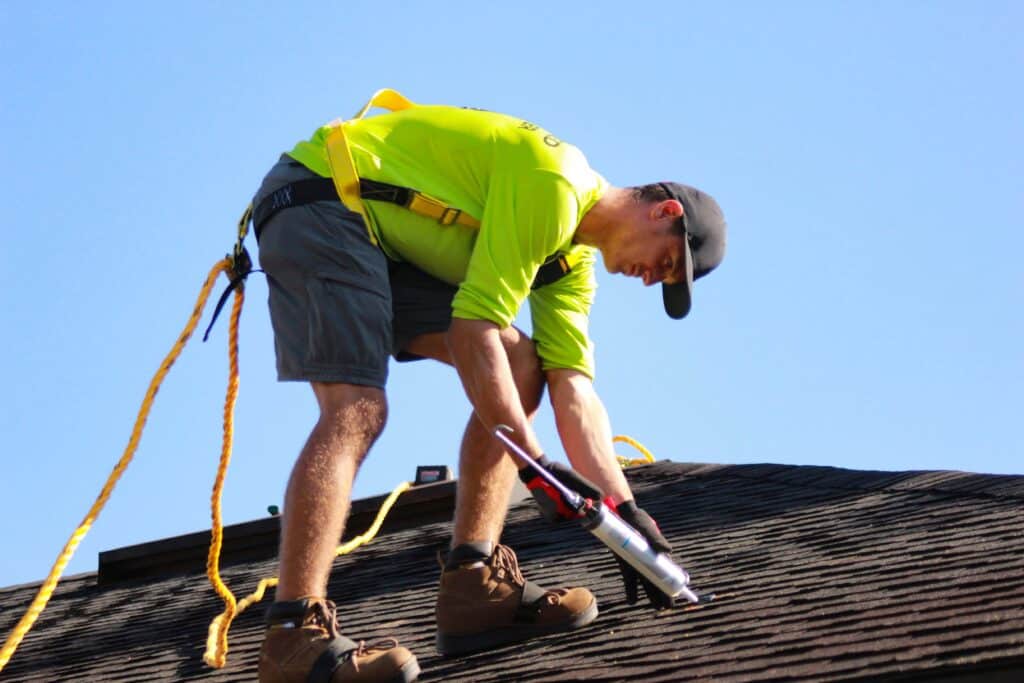
Washington homes are already at high risk of roof leaks because of the above-average amount of rainfall the state sees. Some areas of Washington receive between 150 and 200 inches of rain each year, which is about five times the national average.5 Couple the state’s above-average rainfall with an inexperienced DIY installation, and you’re asking for issues.
You might save money upfront by doing a DIY installation, but you could end up spending more in the long run if you need to pay for repairs for roof replacement and water damage.
DIY Panels May Lack the Efficiency Required in Washington
DIY solar panels are almost always significantly less efficient than professional options, and they tend to lose efficiency more quickly.
Residents in states like Washington and Oregon see a serious lack of sunlight, which means solar customers in the area need to take full advantage of the sun that is available. High-efficiency panels from professional installation companies are far more likely to be able to meet the energy needs of Washington residents.
Again, a DIY installation will almost always cost less initially, but a professional system could very well lead to greater energy savings over time and be more valuable in the long run.
Warranty Coverage is Minimal on DIY Kits
Finally, DIY solar kits come with minimal warranty coverage, usually averaging between five and 10 years for the equipment alone. Warranties on professionally installed systems can last as long as 25 to 30 years, and they can cover equipment, efficiency and labor.
Since efficiency in Washington is so critical, it’s far better to have lengthy efficiency warranties that guarantee your panels will continue to produce for decades after installation. These efficiency warranties help ensure that a professional system will pay for itself and continue to provide savings. The same cannot be said about many DIY systems.
What Should Washingtonians Look For in a Solar Installer?
There are a few things you should look for in a solar provider for your Washington home.
- Affordable and efficient solar solutions
- Lengthy warranties
- Years of experience with local installations
Affordable and Efficient Equipment
One of the first things we recommend you look for is a company that carries highly efficient solar panels at a reasonable price.
Washington solar customers need to prioritize panel efficiency ratings because of the lack of available sunlight in the area. More efficient panels will generate more energy in both sunny and cloudy weather, the latter of which is more prevalent in Washington.
It’s also a good idea to consider the cost of the panels compared to the value. Companies that offer SunPower panels will usually be a bit more costly on average, but the maximum energy production those panels provide is worth the extra money.
Robust Warranty Coverage
Washington property owners can experience massive amounts of rain, depending on where in the state they reside. Some areas receive more than five times the national average, meaning the risk of roof leaks from an improper installation is extremely high.
We recommend prioritizing companies that provide lengthy and robust solar warranty coverage. Coverage for physical damage and efficiency is great, but we suggest giving precedence to companies that provide long labor warranties. You’re far less likely to see roof leaks if the company guarantees the installation is done properly, even in rainy Washington.
Local Experience
Finally, we suggest you look for companies that have several years of experience servicing Washington specifically.
Since the popularity of solar has soared in the past few years in the Evergreen State, many new companies have popped up to meet the demand. New installers are less likely to have industry affiliations and electrician certifications — like from the North American Board of Certified Energy Practitioners (NABCEP) — which help guarantee a successful installation.
Additionally, companies that have years of experience in Washington are more likely to be familiar with the local incentives available. Since solar energy systems are more expensive in Washington than in most states, incentives are crucial for keeping costs down and maximizing savings.
The cost information presented in this article is derived from a comprehensive analysis, incorporating data from multiple industry sources. The average cost per watt per state was calculated based on figures from Consumer Affairs, Energy Sage, and Berkeley Lab’s Electricity Markets & Policy Department. Additionally, monthly energy consumption and the average monthly cost of electricity were sourced from the U.S. Energy Information Administration, ensuring a well-rounded and accurate representation of the information presented.
Methodology: How We Reviewed the Best Solar Companies in Washington
Given that there are over 60 solar installers that serve the State of Washington, we spent dozens of hours researching different providers to find the best of the best. We ranked companies based on six primary factors, which we believe are the most important for a positive experience in your area. We’ll explain our ranking system below.
- Local reputation and reviews (20%): First, since the demand for solar in Washington is high and a lot of companies pop up to turn a profit, we look at a company’s reputation in the state and read through as many customer reviews as possible to see where the company excels and where it falls short. We assess the overall customer sentiment and consider how likely a provider is to offer you a positive experience and good service.
- Pricing and financing (20%): Since the cost of solar equipment in Washington is well above average, we next prioritize companies that have affordable pricing, either in line with or below the local average. We also prefer companies that accept multiple payment options for accessibility. PPAs aren’t widely available in Washington, but companies that accept leases do get ranked a bit higher, even though we don’t recommend this option over paying in cash or with a loan.
- Services offered (20%): Next, we consider the services provided by each installer. Companies like Blue Raven that only install panels lose some points in this category, while others that handle EV chargers, solar batteries and energy efficiency upgrades get ranked higher. They’re more likely to appeal to more customers, making them a more appealing option overall.
- Warranty coverage (20%): Since PV systems in Washington are quite expensive, we rank companies higher that offer more robust warranty coverage. We especially look for lengthy workmanship warranties, as these can help ensure your system stands up to the above-average rainfall in the area without any issues.
- Company experience (10%): Unfortunately, areas like Washington that have seen an increase in demand for solar in recent years are prone to fly-by-night companies that enter the industry just to turn a profit. They often provide sub-par customer service and are more likely to go out of business, which could affect your warranty coverage. We do our best only to recommend companies that have a decade or more of experience, and local experience is also prioritized to some extent.
- Brand quality (10%): Finally, we look at the panel brands that each installer provides access to. We love to see companies with a wide range of products available, as this makes it easier for solar customers with different priorities — like low installation costs or maximum production to meet high energy needs — to choose a brand that suits them.
FAQ: Best Solar Companies in Washington
The EcoWatch team is pleased to get tons of questions from Washington homeowners about going solar. Below are the questions we see most frequently, along with our responses. If you have specific questions that aren’t answered here, reach out to our team of solar experts at solar@ecowatch.com.
Based on our complete company reviews, we determined that Puget Sound Solar is the most reputable solar provider in Washington. This company provides outstanding customer service, a huge range of products and services and has the local knowledge and experience required to get you the best solar array to meet your needs and expectations. The warranty coverage provided is also promising and gives Washington residents the peace of mind they need.
Yes, it most certainly does. Washington gets more rain than most states throughout the country and receives only 165 sunny days per year, well below the national average of 205. As such, most property owners need high-efficiency panels that can provide enough energy even in suboptimal conditions to offset electric bills.
Some companies don’t carry the highest-efficiency panels, so the product selection is something to consider when going solar in the Evergreen State.
Finding the most affordable solar company involves getting free quotes from the top installers in the state. Instead, it’s best to weigh the cost against the value provided in terms of quality products and warranty coverage. Using our EcoWatch rating and quote tool is an easy way to find the highest-value solar panel installation company that fits within your budget.
According to data from the Solar Energy Industries Association (SEIA), there are 154 solar companies in Washington.7 An estimated 64 of these companies are dedicated to installing solar panels and solar equipment.
Most Washington residents — all of whom are well-acquainted with inclement weather — ask us this question. The answer is yes, solar panels will still work when it’s raining. However, energy production during cloudy or rainy days will naturally be lower due to less sunlight hitting your panels. For this reason, high-efficiency solar panels — like SunPower panels — and larger solar electric systems are usually best for Washington homeowners.
Top Solar Installers in Washington Cities
Comparing authorized solar partners
-
- Most efficient panels on the market
- National coverage
- Cradle to Cradle sustainability certification
- Great warranty coverage
- Expensive
- Customer service varies by local dealer
A+Best National Provider1985SunPower Panels25-year all-inclusive warranty
Having trouble deciding? Click below and use our process to receive multiple quotes instead:

 233k
233k  41k
41k  Subscribe
Subscribe 


